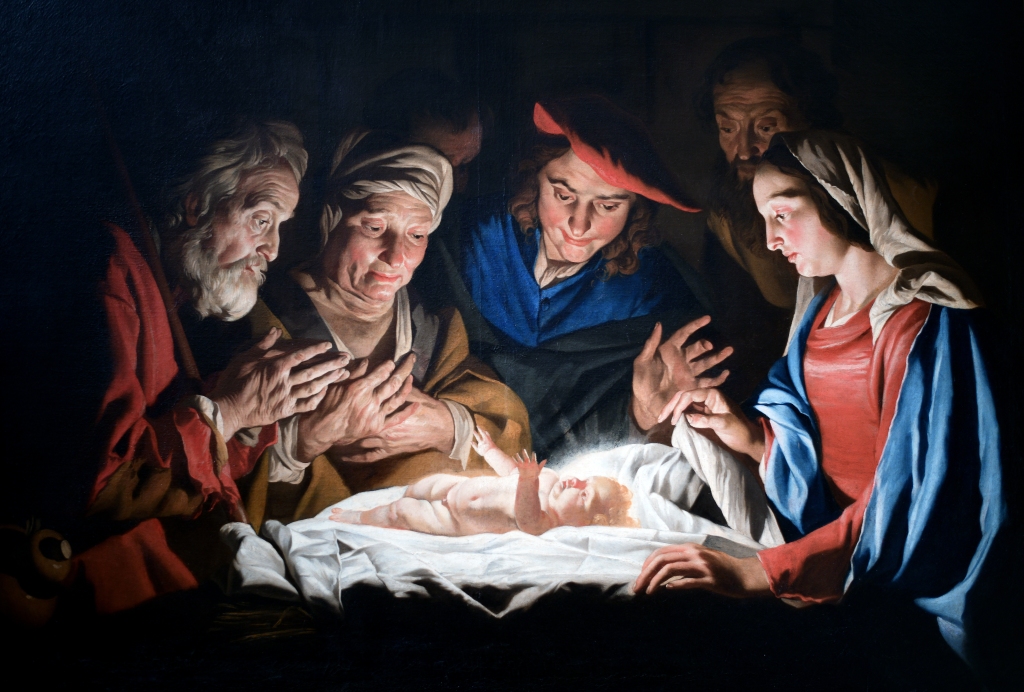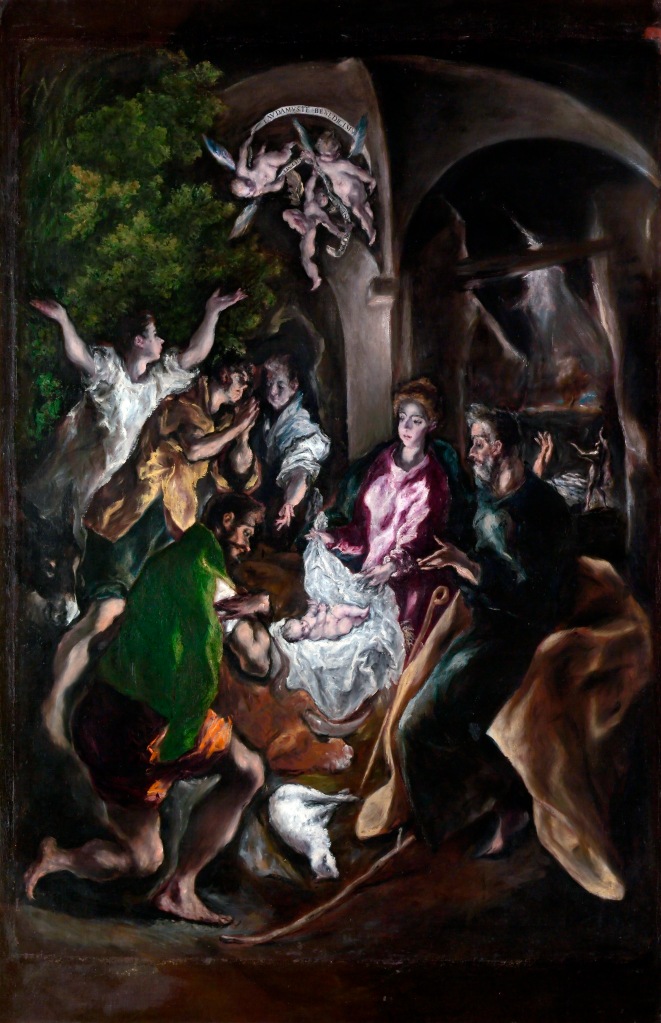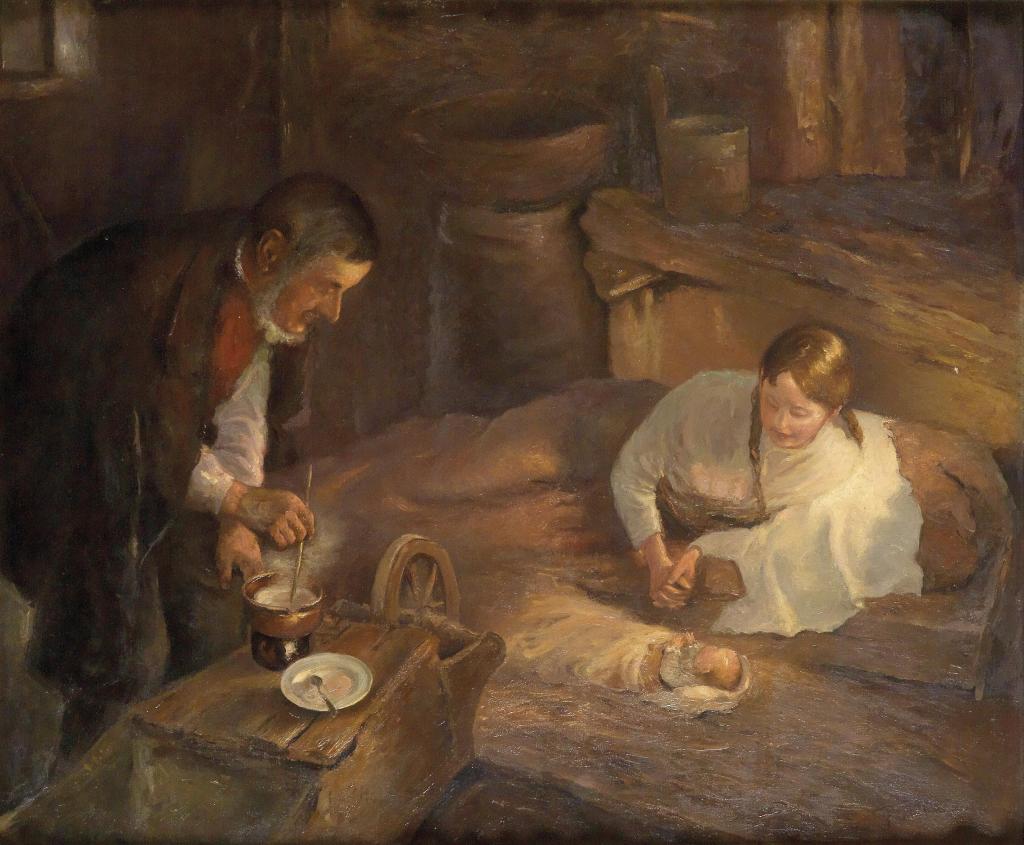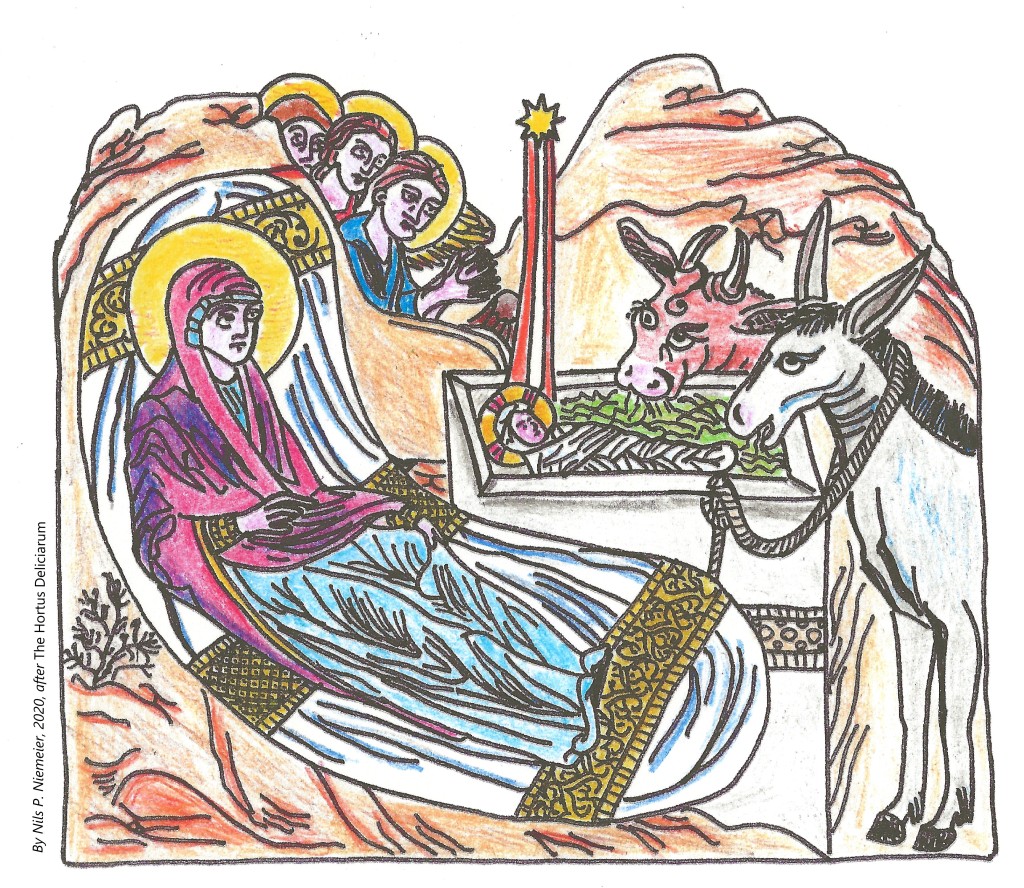
My dear brothers and sisters in Christ,
Today we are witnesses to a wondrous mystery, the likes of which has never happened before, and will never happen again. A moment when the divine and the human realms have merged, when God steps down from the heavenly realms to us and takes on our form in its totality. A moment when “He Who is above, now for our redemption dwells here below; and he that was lowly is by divine mercy raised.”[1] Today, we hear of and experience the mystery of God in the Flesh. The Incarnation. The day when “the Word became flesh and dwelt among us, and we have seen his glory, glory as of the only Son from the Father, full of grace and truth” (John 1:14). At this wondrous happening, we would do well to do as the sermon hymn suggests:
“Let all mortal flesh keep silence,
and with fear and trembling stand.
Ponder nothing earthly minded,
for with blessing in his hand
Christ our God to earth descending
comes, our homage to demand.”[2]
Mark well what has happened here. The finite, the flesh, now contains the infinite power and majesty of God. The Creator of the Universe, the eternal Word through Whom all things were made, existing since eternity with the Father, has come down from heaven and become a creature, born through His mother who He Himself had made. “He Himself with the Father precedes all spans of time; but on this day, issuing from His mother, He stepped into the tide of the years.”[3] The momentousness of this, the incredible wonder of it, can hardly be expressed. The Creator of all has become a baby, a helpless infant. There is no majesty about the way an infant comes into the world–naked, screaming, vulnerable, covered in vernix caseosa, blood, and amniotic fluid. But our Lord and Maker, our Redeemer, comes to us precisely in this way, the same way that all of us came into the world. As St. John Chrysostom wrote in his Christmas Day sermon in the year 386:
What shall I say! How shall I describe this Birth to you? For this wonder fills me with astonishment. The Ancient of days has become an infant. He Who sits upon the sublime and heavenly Throne, now lies in a manger. He Who cannot be touched, Who is simple, without complexity, and incorporeal, now lies subject to the hands of men.[4]
And why did the “true light which enlightens everyone,” the very Word of God who was and is God, the one through whom all of creation has come into being, come down in this way to us, to “pitch his tent of flesh and dwell among us” as one of us? Why did he become a vulnerable child like us? St. Athanasius of Alexandria, speaking on the subject as to whether or not Christ has a human mind, said, “What has not been assumed has not been redeemed.” That is to say, whatever thing belonging to humanity that Christ has not put on, is not redeemed through him. If Christ is not fully human (apart from His being without sin), humans are not fully freed from the bondage of sin. Indeed, Christ, having become one of us, “Lord of Lords in human vesture,” is truly human. Truly human as human beings were once supposed to be in the beginning when God created Adam and Eve totally good and without sin. We often say, following the Latin moralist Plutarch, that “to err is human,” but in reality, nothing could be further from the truth. To be truly human is to be free from sin.
But as we know, Satan deceived Eve, and sin was ushered into the world. Her assent and her husband’s failure to love and care for her as a husband ought led to the downfall of all mankind and the descent of the creation into chaos and this present darkness. And Christ has come into this present darkness to dispel it, for He is “the life of men” and the “light shining in the darkness, and the darkness has not overcome it.” As Chrysostom explains it,
As Eve, being deceived, uttered a word that was the cause of death, so Mary, receiving good tidings, brought forth in the flesh a Word that gave us eternal Life. The word of Eve led to the tree, because of which Adam was driven from Paradise; the Word which the Virgin brought forth, led to the Cross, because of which the Thief, standing in the place of Adam, was led into Paradise. … Seeing that men, abandoning Him, fashioned for themselves idols, to which, offending God, they gave adoration, for which cause, on this day, the Word of God being truly God, appeared in the form of man, that He might set aright this falsehood; and in a veiled manner, has turned all adoration unto Himself.[5]
Jesus, the incarnate Word, came down from heaven as a baby to set right the horrible wrong committed by our first parents and to save His creation from the fate of sin, death, and hell they wrought. He came as a baby “that He should not terrify us [in His majesty] but rather that with love and favor He should console and confirm” those who believe in Him by giving them eternal life.[6] “He was in the world, and the world was made through Him, yet the world did not know Him. He came to his own, and his own people did not receive Him” (John 1:10-11). Distracted by sin and the cares of life, so many have not recognized that God is in the manger or have outright rejected Him. So many have seen the incarnate God, and noting His weakness have said, “Can this be my God?” But they do not understand that, in the Incarnation, as St. Augustine says:
Man’s Maker was made man, that He, Ruler of the stars, might nurse at His mother’s breasts; that the Bread might be hungry, the Fountain thirst, the Light sleep, the Way be tired from the journey; that the Truth might be accused by false witnesses, the Judge of the living and the dead be judged by a mortal judge, Justice be sentenced by the unjust, the Teacher be beaten with whips, the Vine be crowned with thorns, the Foundation be suspended on wood; that Strength might be made weak, that He who makes well might be wounded, that Life might die. He was made man to suffer these and similar undeserved things for us, that He might free us who were undeserving; and He who on account of us endured such great evils, merited no evil, while we who through Him were so bountifully blessed, had no merits to show for such blessings.[7] This helpless baby is indeed our God. In fear and trembling, marvel at the wonder of Him!

Brothers and sisters, by grace through faith in Him Who gave the right to become children of God to all who believe on His name, we have been made children of God and have received “grace upon grace.” At this anniversary of His incarnation, let us worship Him, knowing that at His coming into the world, “the ancient slavery is ended, the devil confounded, the demons take to flight, the power of death is broken, paradise is unlocked, the curse is taken away, sin is removed from us, error driven out, truth has been brought back, the speech of kindliness diffused, and spreads on every side, [and] a heavenly way of life has been implanted on the earth.”[8] The darkness of this world cannot overcome Him Who lies in the manger. For with His Incarnation, “now and forever, the day breaks and the shadows flee away.”[9] Let us walk in the true Light of our Sun of Righteousness, knowing what this day means. Let us rejoice and delight in the Babe in the manger. Amen!
[1] https://anglicancompass.com/let-john-chrysostom-preach-his-nativity-sermon-the-sunday-after-christmas/
[2] “Let All Mortal Flesh Keep Silence,” from the Cherubic Hymn; this possibly predates the Cherubic Hymn, dating to ca. 275.
[3] Augustine, “Sermon 9,” in St. Augustine: Sermons for Christmas and Epiphany, ed. Johannes Quasten and Joseph C. Plumpe, trans. Thomas Comerford Lawler, vol. 15, Ancient Christian Writers (New York; Mahwah, NJ: The Newman Press, 1952), 107.
[4] https://anglicancompass.com/let-john-chrysostom-preach-his-nativity-sermon-the-sunday-after-christmas/
[5] https://anglicancompass.com/let-john-chrysostom-preach-his-nativity-sermon-the-sunday-after-christmas/
[6] Martin Luther. Martin Luther’s Christmas Book (Kindle Locations 270-272). Kindle Edition.
[7] Augustine, “Sermon 9,” in St. Augustine: Sermons for Christmas and Epiphany, ed. Johannes Quasten and Joseph C. Plumpe, trans. Thomas Comerford Lawler, vol. 15, Ancient Christian Writers (New York; Mahwah, NJ: The Newman Press, 1952), 107.
[8] https://anglicancompass.com/let-john-chrysostom-preach-his-nativity-sermon-the-sunday-after-christmas/
[9] FRA GIOVANNI, A Letter to the Most Illustrious the Contessina Allagia Dela Aldobrandeschi, Written Christmas Eve Anno Domini 1513 (193?). From Respectfully Quoted: A Dictionary of Quotations, 1989. https://www.bartleby.com/73/1467.html

